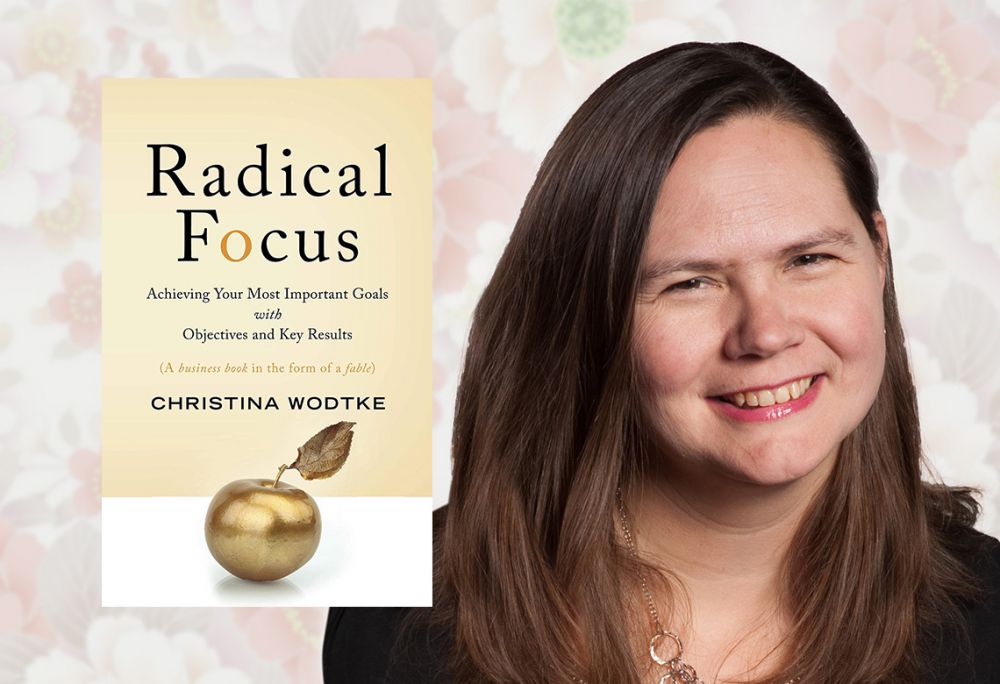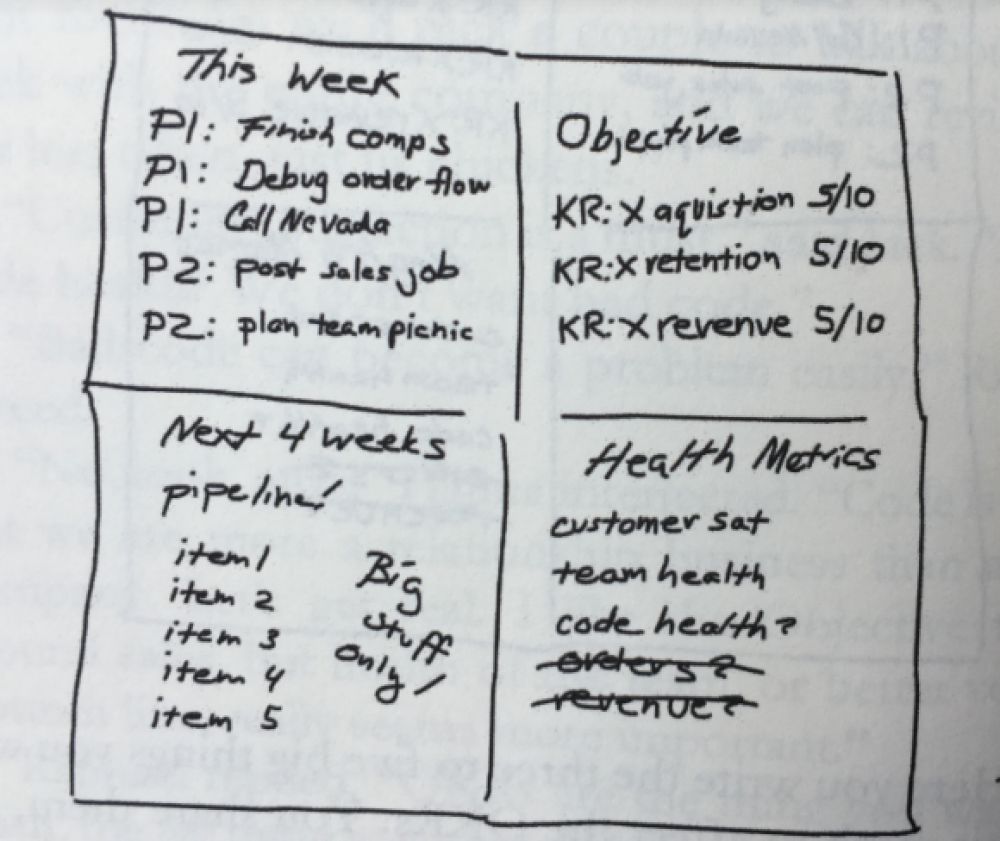Here’s the super-easy framework Google credits for its multiple 10x growth

Intel first started them.
Linkedin, Twitter, Uber, Disney and Walmart love them.
And, co-founder Larry Page credits OKRs with leading Google to “10x growth, many times over”. (Google also had the benefit of a "trillion dollar coach".)
OKRs (Objectives and Key Results) are fast becoming the world’s preferred goal-setting method.
In a nutshell, OKRs are: “I will [objective] as measured by [key result]”.
Radical Focus author Christina Wodtke, who led large teams at Yahoo, Zynga, MySpace and LinkedIn, explains why they're so powerful in her interview with The Growth Faculty:
- OKRs (Objectives and Key Results) are “KPIs with a soul”.
- Objectives (clearly defined goals) appeal to people who are more creative (or less metrics driven)
- Key results (KRs) are specific measures, and appeal to the people who like hard numbers.
- You have to revisit your OKRs every single week. Here’s what I’m going to try next week. This is what worked. This is what didn’t work.
- The rhythm of OKRs is really, really powerful. Suddenly you have a framework that speaks to the entire company. It pulls everybody together in the same direction.
- You should feel mild terror at the thought of the objective/goal. Go for goals that have a 5/10 (or 50%) chance of achieving.

Image: OKRs example from Radical Focus
Christina’s GREAT EIGHT
(8 getting to know you questons we ask all our authors)
Recommended book? I’m mad for books, as you can tell from my bookshelf in my office at Stanford. I really loved The Overstory (fiction), and, for business, Amy Edmondson’s new book, The Fearless Organization, is completely brilliant. It’s a book on psychological safety by the woman who basically invented psychological safety, the thing that’s transformed many companies, and it is a page turner. I read it from cover to cover. There’s no filler, there’s no junk. There’re just wonderful stories and practical techniques. I love it. [Editor's note: The Growth Faculty - On Demand is interviewing Amy Edmonson about The Fearless Organisation. More info here.)
How did you get your first job? I made popcorn at a movie theatre in Kansas city, Missouri, and I probably saw a Help Wanted sign. I just remember it was the year that Alan Alda had a really terrible movie about the Revolutionary War, but everybody would come see it because Prince’s new movie was a trailer, so they’d buy a ticket to see the Prince trailer and then leave afterwards.
If you were not doing the job that you are doing now, what would you like to be doing instead? Hey, I designed my life. Everything I do is exactly what I want to be doing. I love writing, I love teaching students. I am literally one of the few people on earth who is doing exactly what they chose for themselves.
How do you push yourself when the going gets tough? OKRs. I really do do personal OKRs. Every single month I set myself a goal that’s something outside of my regular job responsibilities. Then I have my weekly check-ins with my group, and I hired a personal coach that I send my OKRs to. Then I decide what I’m doing towards it. Anytime I have something new, like another book to start, I set OKRs around it. That structure really helps when you have a very unstructured life.
What’s one of the best decisions that’s improved your career? I think the best decision that I’ve made over and over again has been asking for things that I didn’t think I was good enough for. When I saw this application to teach at Stanford, I thought, “Who am I? I don’t have a PhD." I’ve mostly worked in industry. I’m teaching at an art school. I don’t deserve to teach at Stanford.” Then I thought, “Well, is that true? Why don’t I try?" Here I am. I feel like throughout my whole life, I’ve gone for jobs that I really wanted, but I wasn’t sure if I could get or not. I think for women, in particular, sometimes we feel like we have to be just perfect. The reality is, sometimes you just have to ask. You never know what’s possible until you try.
What’s a fun fact that’s not widely known about you? I can do a lot of origami with Post-it notes when I’m in a really boring meeting. Sometimes I’ll make little animals and flowers.
What’s been your lowest moment and how did you recover from that? There’ve been some really hard moments. Divorce was really, really hard. When I first got divorced, I had 50/50 custody with my daughter, and that was what was really hard, was not seeing my daughter half the week. It was really painful. I was at LinkedIn, and I was working crazy hours, and I wanted to spend more time with her. I got a job with Myspace, and I asked, “Can I work out of the San Francisco office on Mondays and Tuesdays when I have my daughter, and go to LA Wednesdays and Thursdays where the head office was?” They said yes, and I spent a year flying to LA, living in the Beverly Wiltshire. Sometimes you have to imagine the world you’d like to live in and then try to make it happen.
What’s one prediction that you could make for 2025? AI is definitely arriving, and it’s going to be part of all businesses the way the internet is part of all businesses. However, I think AR, augmented reality, having technology that’s like a layer over our everyday lives, will be the hot new thing.
This is an edited version of our interview with Christina Wodtke, Adjunct Professor, Continuing Education at Stanford University. Her book Radical Focus is written as a business fable about two founders and beautifully explains the concept of OKRs.
To buy Christina Wodtke's book Radical Focus from Booktopia, click here. The Growth Faculty Members can watch, listen, or read the transcript of our full interview with Christina Wodtke by downloading the video, transcript or MP3 audio file, after logging on to the On Demand platform and clicking here.
If you are not currently a member of The Growth Faculty, click here to become a member to access our On Demand platform and discounts on LIVE events. First 14 days are free.
- You start experimenting like crazy. You want to create a space where people can be daring, and ridiculous.
- At regular weekly check-ins you ask: Are we getting closer? Are we getting farther? What are we doing to make that number?
- You don’t have to do it perfectly, but you do have to commit.
Christina’s GREAT EIGHT
(8 getting to know you questons we ask all our authors)
Recommended book? I’m mad for books, as you can tell from my bookshelf in my office at Stanford. I really loved The Overstory (fiction), and, for business, Amy Edmondson’s new book, The Fearless Organization, is completely brilliant. It’s a book on psychological safety by the woman who basically invented psychological safety, the thing that’s transformed many companies, and it is a page turner. I read it from cover to cover. There’s no filler, there’s no junk. There’re just wonderful stories and practical techniques. I love it. [Editor's note: The Growth Faculty - On Demand is interviewing Amy Edmonson about The Fearless Organisation. More info here.)
How did you get your first job? I made popcorn at a movie theatre in Kansas city, Missouri, and I probably saw a Help Wanted sign. I just remember it was the year that Alan Alda had a really terrible movie about the Revolutionary War, but everybody would come see it because Prince’s new movie was a trailer, so they’d buy a ticket to see the Prince trailer and then leave afterwards.
If you were not doing the job that you are doing now, what would you like to be doing instead? Hey, I designed my life. Everything I do is exactly what I want to be doing. I love writing, I love teaching students. I am literally one of the few people on earth who is doing exactly what they chose for themselves.
How do you push yourself when the going gets tough? OKRs. I really do do personal OKRs. Every single month I set myself a goal that’s something outside of my regular job responsibilities. Then I have my weekly check-ins with my group, and I hired a personal coach that I send my OKRs to. Then I decide what I’m doing towards it. Anytime I have something new, like another book to start, I set OKRs around it. That structure really helps when you have a very unstructured life.
What’s one of the best decisions that’s improved your career? I think the best decision that I’ve made over and over again has been asking for things that I didn’t think I was good enough for. When I saw this application to teach at Stanford, I thought, “Who am I? I don’t have a PhD." I’ve mostly worked in industry. I’m teaching at an art school. I don’t deserve to teach at Stanford.” Then I thought, “Well, is that true? Why don’t I try?" Here I am. I feel like throughout my whole life, I’ve gone for jobs that I really wanted, but I wasn’t sure if I could get or not. I think for women, in particular, sometimes we feel like we have to be just perfect. The reality is, sometimes you just have to ask. You never know what’s possible until you try.
What’s a fun fact that’s not widely known about you? I can do a lot of origami with Post-it notes when I’m in a really boring meeting. Sometimes I’ll make little animals and flowers.
What’s been your lowest moment and how did you recover from that? There’ve been some really hard moments. Divorce was really, really hard. When I first got divorced, I had 50/50 custody with my daughter, and that was what was really hard, was not seeing my daughter half the week. It was really painful. I was at LinkedIn, and I was working crazy hours, and I wanted to spend more time with her. I got a job with Myspace, and I asked, “Can I work out of the San Francisco office on Mondays and Tuesdays when I have my daughter, and go to LA Wednesdays and Thursdays where the head office was?” They said yes, and I spent a year flying to LA, living in the Beverly Wiltshire. Sometimes you have to imagine the world you’d like to live in and then try to make it happen.
What’s one prediction that you could make for 2025? AI is definitely arriving, and it’s going to be part of all businesses the way the internet is part of all businesses. However, I think AR, augmented reality, having technology that’s like a layer over our everyday lives, will be the hot new thing.
This is an edited version of our interview with Christina Wodtke, Adjunct Professor, Continuing Education at Stanford University. Her book Radical Focus is written as a business fable about two founders and beautifully explains the concept of OKRs.
To buy Christina Wodtke's book Radical Focus from Booktopia, click here. The Growth Faculty Members can watch, listen, or read the transcript of our full interview with Christina Wodtke by downloading the video, transcript or MP3 audio file, after logging on to the On Demand platform and clicking here.
If you are not currently a member of The Growth Faculty, click here to become a member to access our On Demand platform and discounts on LIVE events. First 14 days are free.


 Australia
Australia
 European Union
European Union
 New Zealand
New Zealand
 United Kingdom
United Kingdom
 United States
United States
 Singapore
Singapore

